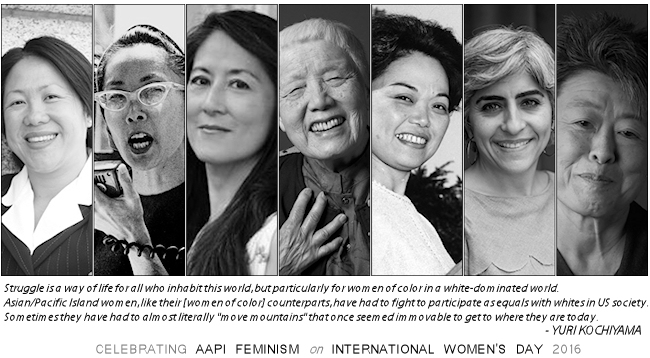In celebration of today’s International Women’s Day, I’m posting some excerpts from Dragon Ladies: Asian American Feminists Breathing Fire.
There are many facets of womanhood that deserve attention today, and every day. If you are spending today in celebration of International Women’s Day, I hope you will dedicate part of that time to celebrating the lives and legacies of our nation’s proud and unapologetic AAPI feminist women.
From the Foreward of Dragon Ladies: Asian American Feminists Breathe Fire by Karin Aguilar-San Juan:
The fact of the matter is that from its very conception as an organizing principle, Asian America has masked a series of internal tensions. In order to produce a sense of racial solidarity, Asian American activists framed social injustices in terms of race, veiling other competing social categories such as gender, sexuality, ethnicity, and nationality. The relative absence of gender as a lens for Asian American activism and resistance throughout the 1970s until the present should therefore be read as neither an indication of the absence of gender inequality nor of the disengagement of Asian American women from issues of social justice.
… I have heard too many community activists explain the intersection of gender and race by referring to disembodied identities, fractions of human experience: “First I am a person of color, then I am a woman. That makes me doubly oppressed.” According to this way of adding, a white man has the most whole identity; his experience is treated as the norm. The notion that the Asian American women’s movement consists of “two movements in one” relies on this convenient but unreasonable arithmetic. Instead, Asian American feminism is an articulation of the necessary overlap of many social and historical processes of hierarchy and injustice.
This overlap is necessary in the sense that Asian American feminists must think, write, and act from their particular gendered and racialized contexts. Although in theory we can isolate one dimension of social life (the experience of being female) from another (the experience of being Asian American), in fact such a one-dimensional moment never exists.
…Because Asian American feminism emerges in a context that is not already encapsulated by the prevailing sites of feminist struggle, the ideas and accomplishments of Asian American feminists need to be considered on their own terms. As they struggle for empowerment, they find there is no perfect solution, no political formula. Anyway, Asian American political resistance is not predicated on such cleanliness. Instead, as [the writers of this anthology] show, activism involves an opening up of possibilities, an acknowledgement of fragile bonds, and most important, an articulation of a commitment to justice.
And from anthologist Sonia Shah’s Introduction of the same book:
An Asian American feminist movement is the only movement that will consistently represent Asian American women’s interests. As the chapters in this book illustrate, neither the feminist movement nor the Asian American movement have taken Asian American women’s interests into consideration on their agendas. But it’s much more than that. An Asian American feminist movement is vital for the larger project of uncovering the social structure, with its built-in injustices and inequities, that affect us all. In today’s global economy, in which nothing is certain for anyone save the most elite of the elite, this is a project that vitally concerns the majority.
…Asian American women are already making their movement happen. A different sort of Dragon Lady is emerging — not a cold-blooded reptile, but a creature who breathes fire.
Finally, if you are motivated to help protect the causes of AAPI feminism, you can start by learning more about how (among many other issues of interest to us) AAPI feminists are focused on protecting reproductive rights around the country by challenging the passage of restrictive abortion laws in various states. These laws are often introduced and rationalized by citing sexist and anti-Asian stereotypes to invoke Yellow Peril fears of immigrant women. In fact, the National Asian Pacific American Women’s Forum (NAPAWF) sent an email to supporters last night, urging readers to sign this petition opposing such a law — HB1337 — that would limit abortion access in Indiana. I urge you to sign this petition, and to join AAPI feminists in the larger fight to achieve racial and gender justice for AAPIs, and all people.

